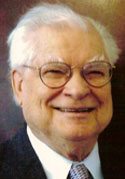A liberal artist
A reader gave me a mild rebuke a few weeks back about how I appeared to devalue my liberal arts education while reporting on the technical problems that arose while our station engineer was away. His point was that the focus of the liberal arts on creative flexibility might enable one to function in a wider variety of situations than the utilitarian approach to learning that comes with technical education.
 That I should be properly grateful for my education was brought home to me again by the death Monday of my great teacher and friend, Kelsie Harder, who for many years chaired the SUNY Potsdam English Department. He had the gift for transmitting his passions, taking such unpromising material as myself and my callow classmates, and infecting us--not just with interest, but with fascination--for unlikely topics such as linguistics, grammar, etymology and onomastics. He labored in the sub-basement of language, where the qualities of time, matter and space intersect with the mind to become speech. How does a meme come to mean?—or, Shakespeare’s more-than-rhetorical query, "What's in a name?"--these are questions that will never come up in a job interview, unless the job is writer. But what the study of Clausewitz is to the general, these matters are to the author. Their study unlocks all the strategy and tactics necessary to communicate with clarity, integrity and effect.
That I should be properly grateful for my education was brought home to me again by the death Monday of my great teacher and friend, Kelsie Harder, who for many years chaired the SUNY Potsdam English Department. He had the gift for transmitting his passions, taking such unpromising material as myself and my callow classmates, and infecting us--not just with interest, but with fascination--for unlikely topics such as linguistics, grammar, etymology and onomastics. He labored in the sub-basement of language, where the qualities of time, matter and space intersect with the mind to become speech. How does a meme come to mean?—or, Shakespeare’s more-than-rhetorical query, "What's in a name?"--these are questions that will never come up in a job interview, unless the job is writer. But what the study of Clausewitz is to the general, these matters are to the author. Their study unlocks all the strategy and tactics necessary to communicate with clarity, integrity and effect.Kelsie was a great exemplar of and recruiter for his vocation, teaching. More than a few of his students have gone on to do likewise. I think this is because he treated the student-teacher relationship as just that, a personal relationship, not a pedagogical contract. That makes his loss a personal matter to thousands.


0 Comments:
Post a Comment
<< Home